Bone health is a critical aspect of overall well-being, particularly as individuals age and susceptibility to bone-related disorders increases. Maintaining proper bone density plays a vital role in preventing fractures and maintaining an active lifestyle. While there are multiple methods to support skeletal strength, this article focuses on the potential benefits of Moringa, a plant known for its nutritional value and therapeutic properties. By exploring the impact of Moringa on bone density during the aging process, we can shed light on a natural approach to support healthy bones and enhance quality of life in later years.
The Role of Bone Density in Aging
Understanding Bone Density
Bone density refers to the amount of mineral matter present in bone tissue, determining its strength and resilience. As individuals age, bone density naturally declines, leading to a higher risk of fractures and bone-related disorders such as osteoporosis. Maintaining healthy bone density is crucial for preserving skeletal strength and preventing the complications associated with bone loss.
Factors Affecting Bone Density
Various factors contribute to changes in bone density, including hormonal shifts, nutritional deficiencies, and reduced physical activity. Additionally, genetic predispositions and certain medical conditions can impact bone health. Addressing these factors early and incorporating strategies to improve bone density can help mitigate the risks associated with aging.
Moringa: A Nutritional Powerhouse
A Brief Overview
Moringa oleifera, commonly referred to as the "miracle tree," is native to South Asia and Africa. Almost all parts of the Moringa tree – leaves, seeds, flowers, and roots – offer nutritional benefits. Its rich nutritional profile encompasses essential vitamins, minerals, antioxidants, and bioactive compounds that support various aspects of human health.
Nutritional Profile of Moringa: A Boon for Bone Health
Moringa contains several nutrients known to positively impact bone health. Calcium, a crucial mineral for bone density, is present in abundant quantities in Moringa leaves and stems. Other minerals such as phosphorus, magnesium, and potassium also contribute to bone strength. Additionally, Moringa is a rich source of vitamin K, which plays a vital role in bone mineralization.
Rich in Calcium and Magnesium
Calcium: Essential for bone formation and maintenance, calcium is abundantly found in Moringa leaves. Regular consumption can contribute to maintaining the necessary calcium levels in the body, crucial for the elderly.
Magnesium: Works synergistically with calcium to improve its absorption and incorporation into the bone matrix. Magnesium also plays a vital role in converting vitamin D into its active form, further enhancing calcium absorption.
High in Vitamins K and D
Vitamin K: Moringa is a good source of vitamin K, which is vital for bone health as it helps in the production of a protein called osteocalcin, responsible for stabilizing calcium in the bone matrix.
Vitamin D: While Moringa does not contain vitamin D, its high magnesium content aids in the activation of vitamin D obtained from other sources, which is essential for calcium absorption and bone health.
Antioxidant Properties: Combating Oxidative Stress in Bones
Oxidative Stress and Bone Health: Oxidative stress increases with age and has been linked to decreased bone density and various bone diseases. Moringa's high antioxidant content, including vitamins C and E, quercetin, and chlorogenic acid, can neutralize free radicals, potentially reducing oxidative stress and its impact on bones.
Anti-inflammatory Effects: Protecting Against Bone Loss
Chronic Inflammation and Bone Density: Chronic inflammation can lead to bone loss and diseases such as osteoporosis. Moringa contains various compounds with anti-inflammatory properties, which may help in reducing inflammation and protecting bone health.
Scientific Evidence: Moringa and Bone Density
Phytochemicals and Their Role
Moringa Oleifera is rich in various phytochemicals, including polyphenols, flavonoids, and saponins, which have been identified as key contributors to its bone-health-promoting properties. These compounds are known for their anti-inflammatory and antioxidant effects, which play a crucial role in preventing bone loss and facilitating bone regeneration.
Clinical and Preclinical Findings
Animal Studies: Research conducted on rodents has demonstrated that Moringa extracts can significantly improve bone density and strength. For instance, a study published in the "Journal of Osteoporosis" found that rats fed with Moringa leaf powder showed increased femoral bone density and strength compared to control groups.
Human Studies: While research on humans is less extensive, preliminary studies suggest that Moringa supplementation may have a beneficial impact on bone health markers, including calcium and phosphorus levels, which are vital for bone formation and maintenance.
Incorporating Moringa into the Diet
Moringa can be consumed in various forms, including as a powder, capsules, or by incorporating the leaves into meals. Adding Moringa powder to smoothies, soups, or salads is a simple way to enhance nutritional intake. By incorporating Moringa into a balanced diet, individuals can potentially support their bone health naturally.
Beyond adding Moringa powder to smoothies and soups, there are creative ways to incorporate it into your diet to reap its bone health benefits:
Moringa Tea: Steep dried Moringa leaves in hot water for a nutritious tea. Add lemon or honey for flavor.
Moringa-Infused Oils: Use cold-pressed Moringa oil as a salad dressing base for an extra dose of antioxidants.
Baking with Moringa: Incorporate Moringa powder into bread, muffins, or pancake batter for a nutritious boost.
Incorporation in Traditional Dishes
In regions where Moringa is native, its leaves and pods are commonly used in traditional dishes. Drawing inspiration from these cuisines can provide new ways to enjoy Moringa:
Stews and Curries: Fresh Moringa leaves can be added to stews and curries, contributing to the dish's nutritional value without altering its taste significantly.
Salads: Fresh or dried Moringa leaves can be mixed into salads for a nutrient-rich meal.
Daily Recommendations
Given the lack of a standardized dosage for Moringa, it's important to consider individual health goals and nutritional needs. A general guideline might start with one teaspoon (approximately 5 grams) of Moringa powder daily, gradually increasing as tolerated. However, personalization is key:
For Bone Health: Individuals focusing on bone health might aim for higher intakes, guided by nutritional advice and considering their overall diet and calcium intake.
Consultation with Healthcare Providers: Especially crucial for those with medical conditions or those taking prescription medications, as Moringa can interact with certain drugs, particularly those affecting blood sugar and blood pressure.
Conclusion
Supporting bone density is essential for maintaining skeletal strength and overall well-being as individuals age. While there are multiple strategies available, incorporating Moringa into the diet may offer potential benefits due to its rich nutritional profile. Its abundance of bone-supporting nutrients and its emerging positive association with bone mineral density make Moringa a compelling natural approach for promoting healthy bones in later years. However, it remains crucial to consult with healthcare professionals before making changes to dietary habits or incorporating new supplements. By embracing a holistic approach, individuals can potentially enhance their bone health, leading to a fulfilling and active lifestyle in the later stages of life.

